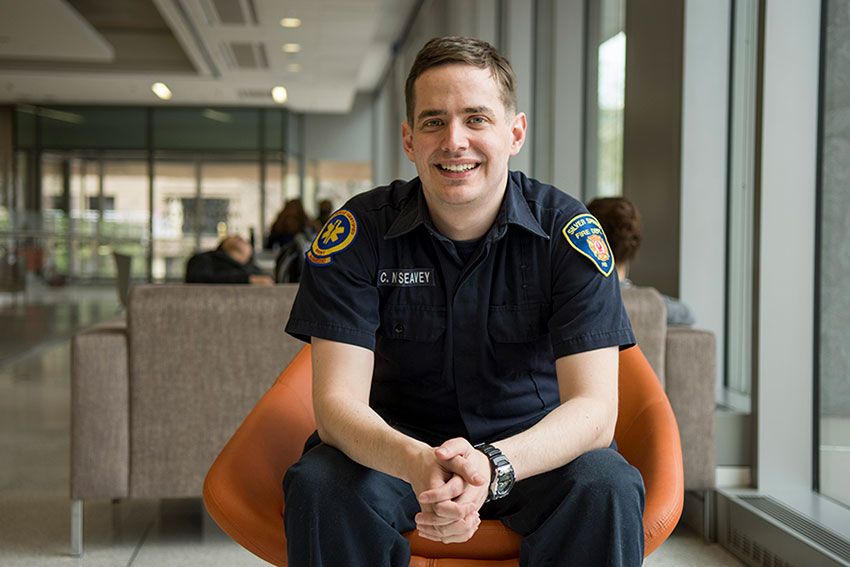
Caleb Seavey, B.A. ’13, graduating medical student at the GW School of Medicine and Health Sciences and veteran paramedic, got the call “on a rainy night at 3 a.m.”
“There had been a serious one-car accident in which three people had died prior to our arrival, two victims had life-threatening injuries, and three more were walking wounded,” Seavey recalled. It was August 2014, and he was five years into his volunteer service as an emergency medical technician (EMT) with the Silver Spring Fire Department, part of Maryland’s Montgomery County Fire and Rescue. There were other EMTs helping that night, along with career firefighters, but Seavey was the paramedic in charge.
“I knew that my job was to bring order to this extraordinary chaos, and I needed to meet that challenge,” he said.
The impact of the crash had been powerful enough to eject a child’s car seat from the vehicle, but Seavey couldn’t see any children as he triaged patients. “This prospect that another patient was not being attended to was naturally horrifying to me as a young medic in charge,” he explained. “But I knew I needed to push all of the ‘what ifs’ out of my head.”
He’s channeled that same concentration as an M.D. student, to his and his patients’ benefit. “Being a first-responder [has given] me an opportunity to work in a high-stakes, high-stress environment that has unquestionably helped me in medical school,” said Seavey, who started volunteering during his undergraduate years at GW. “Going into rotations in particular, when encountering similar emergent scenarios, I have a much calmer and more focused demeanor.”
Although having his medical degree means he’ll no longer be able to volunteer, Seavey has enjoyed his dual roles of student and paramedic, but it hasn’t always been easy balancing responsibilities.
“It got really hard during third year to continue to volunteer as a paramedic as the number of hours on my med school rotations became much more demanding,” he said. “[But] I think you try to find things that rejuvenate you and make it such that you enjoy what you’re doing, and this is something that has given me meaning over the past couple years, and even before that.”
Incidentally, he added, circling back to his story of the late rainy night, the experience has bolstered his confidence for his future. “If there was ever a moment that I questioned whether I possessed [the] important character traits necessary to becoming a surgeon, after that night I no longer had much doubt of it,” said Seavey, who matched in general surgery at the Cleveland Clinic in March. “P.S. There was no child.”


